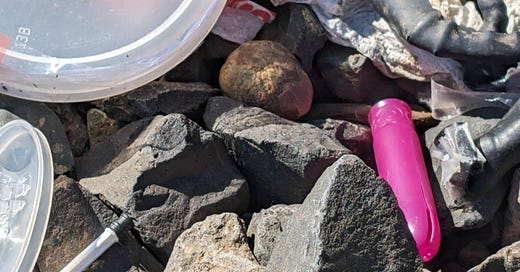A Community Response: Addressing the Menstrual Health Crisis for Women on the Streets
Redefining community support around women's health in Eugene, Oregon
A Note from the Author:
One of the things I appreciate most about living in Eugene, Oregon, is the wealth of knowledge we gain from our local research university. After publishing my last Substack piece on period poverty and the critical need for increased distribution of feminine hygiene supplies to unhoused menstruators, I received an insightful note from Camille Cioffe, a Research Scientist at the Oregon Research Institute. Camille, an expert in harm reduction and data analysis, shared a link a 2021 article she co-authored. The article provided compelling evidence that hygiene items—such as tampons and pads—are among the top requests from those living on the streets. Her deeply informative findings are linked below, and this article is written and inspired by her work.
Trapped in a Tent with No Supplies
While most of my experience learning about direct needs of the unhoused happened while working at 410 Garfield Safe Sleep, my first encounter with the harsh realities of period poverty came at an unexpected time.
In the aftermath of the 2020 McKenzie Wildfires, I was newly appointed as Chair of the Lane County Community Organizations Active in Disaster (COAD), working alongside dedicated leaders across the region. Together, we worked tirelessly to support the formation of the region's Long Term Recovery Group (LTRG), navigating the complexities of disaster recovery in its extended 5-year form.
As subcommittees developed—focusing on "unmet needs," "mental health," “health care,” “rebuilding," and more—I transitioned from co-developing the infrastructure of the LTRG to chairing the "spiritual needs" subcommittee. My role involved partnering with various organizations to provide spiritual support to affected community members, regardless of their faith or background. It was during this time, almost a year before I began working in homeless services, that I heard a story that profoundly impacted me.
A young woman, looking to escape a troubled home, had relocated to Washington Jefferson Park. While seeking other options of shelter, her attempt to stay under the bridge for a day or two lasted longer than she expected. After rejecting a man's sexual advances, this young woman was subject to a massive theft of belongings. Not only was the crime against her personal, it impacted both her health and well-being as she just began her cycle and was left with no money, purse, tampons, or pads.
Ashamed and afraid, she confined herself to her tent for the duration of nearly four days, with limited access to hygiene products or bathing facilities. After enduring isolation and hardship, and afraid that the man might return, she found someone who let her borrow a cell phone to make a singular emergency call. The call rang a community church leader who was working with me on plans to build prayer boxes up the McKenzie. Understandably, the woman cut our meeting short to drive to the park, where she found the young girl and brought her to a place of safety.
The Harsh Realities of Period Poverty on the Streets
For women experiencing homelessness, the challenges go far beyond finding a safe place to sleep at night. For those like the young woman in Washington Jefferson Park, even basic hygiene becomes an insurmountable obstacle, especially during menstruation. When her belongings were stolen, the emotional toll wasn't just about losing possessions—her dignity, safety, and health were stripped away as well.
Living on the streets while trying to manage menstruation is a harsh reality for many homeless women. The lack of access to menstrual products, clean water, and private facilities means that a normal bodily function often become a source of shame and isolation. This can lead to serious health risks, including infections, and perpetuate a cycle of fear and withdrawal from social services that are supposed to help.
The humiliation of bleeding through clothing, the inability to stay clean, and the lack of access to basic necessities are compounded by the constant fear of violence or exploitation, especially in situations like the one this young woman faced. After rejecting a man’s advances, she not only lost her belongings but was also left to manage her period with nothing—trapped in a tent for days. This should not be.
Rising to the Challenge: Local Leaders Confront Period Poverty on the Streets
For far too long, the struggles of menstruating women on the streets have been invisible. Yet, a strong coalition of local women and allies is stepping up to support those who are most vulnerable. Leaders like DeLeesa Meashintubby, Rhonda Busek, and Camille Cioffi have been instrumental in highlighting the critical need for menstrual health resources within our community. Their advocacy, alongside the tireless efforts of street outreach workers and shelter providers—who balance the high demand with limited supplies—is just one part of the solution.
However, funding and donations remain insufficient. Tackling period poverty demands more than short-term aid; it requires systemic change that prioritizes the health and dignity of every woman. We must advocate for lasting support and end the stigma associated with menstruation. Every woman deserves access to basic hygiene. Let’s act not only by donating supplies but also by supporting policies and programs that provide sustained assistance. Together, we can address period poverty and ensure no one faces isolation, fear, or health risks due to a lack of menstrual supplies.
Have your own ideas? Send me a message.
Academic Journal Reference:
Cioffi, C. C., & Seeley, J. R. (2021). Voluntary pregnancy screening at syringe exchanges: A feasibility study. Journal of Prevention and Health Promotion, 2(1), 57-80. https://pmc.ncbi.nlm.nih.gov/articles/PMC8528196/





